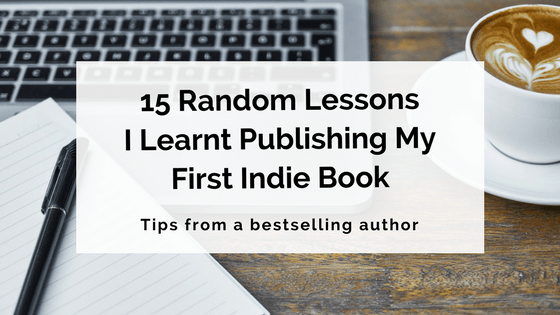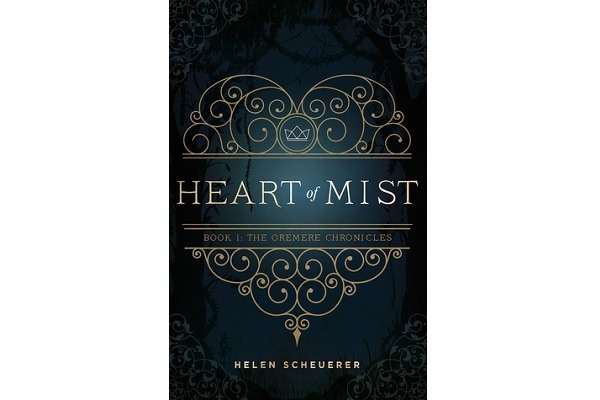Having recently published my first indie book to bestseller status, I’ve realised that there are some lessons best learnt in theory and others in practice.
From market research and the ideal publication schedule, to fielding financial questions and overcoming anxiety, I’ve decided to share 15 of the lessons I’ve recently learnt during the pre-release and post-publication periods.

This is by no means a finite list. I’ve learnt more than I could possibly fit into one post. However, the following lessons have been on my mind recently, and I hope that by sharing them, I can help other authors gain a better idea of what being an indie author is like.
So, without further ado, let’s dive in…
1. Create a realistic publication schedule and stick to it
I read some advice the other day that said if you want to make money writing, you have to publish a book every two to three months. As someone who took a year and a half to write and publish a novel, I was gobsmacked by this supposed wisdom.
Don’t get me wrong; I know where they’re coming from – keep the demand high, build up your backlist, feed the binge-reading beast…
However, I just find it hard to believe it’s possible to churn out three to four good-quality books a year while working at least a part-time job, which many of us do.
For me, my publication schedule looks more similar to a traditionally published author’s: one book a year. I’ve made it clear to my readers when they should expect Book II and Book III in The Oremere Chronicles.
While I would love to publish more frequently, it’s just not feasible for me with everything else I do right now.
And that’s the key: know what is possible for you and acknowledge this when you’re creating your publication schedule.
Nothing upsets readers more than a pushed-back pub date, so be generous with the time you allot yourself for each title.
2. Don’t be ashamed of wanting to make a living
Since the dawn of time, it seems, the notion that writers should suffer for their art has existed. Authors are constantly fighting to put monetary value on their work, constantly battling to receive adequate compensation for their words.
And it’s romanticised – you’ve been living under a rock if you’ve never heard of the penniless, tortured artist.
Authors are often called ‘sell-outs’ if they write for money, or are scoffed at if they admit to having more ambition than just seeing their name in print.
But you can make a living from your writing, and there’s nothing wrong with expressing a desire to do that.
For a while there, I struggled with letting people know I wanted and expected to make a living from my writing. But I’ve realised that the more pride you show in your own work, the more seriously people will take your profession.

3. Market research matters
Don’t be mistaken – I’m not saying write for the market (though there’s nothing wrong with that either). What I mean by ‘market research matters’ is that you should know your target audience!
You need to do your own research about your target market. What other titles do they like? Where are they most vocal about books? Where do they buy their books from? All of these factors will come into play when you’re trying to reach your readership further down the line.
The market research I did contributed massively to the success of Heart of Mist.
Be sure you know your target readers, and know them well.
4. Never underestimate the power of a great cover
Firstly, to clear up any confusion, I’m self-published. Yes, I established a small press and an imprint, and I have experience publishing other books, but Heart of Mist is an independently published title.
However, you wouldn’t know it.
I was lucky enough to have worked with my incredible cover designer on other projects, so I knew who I wanted to do the Heart of Mist cover from the get-go.
I knew my cover was gorgeous. I knew I was 100% happy with it. However, for a second I think I forgot just how powerful a great cover could be.
A well-designed cover is one of the most effective ways to ensure you make your self-published book look professional. My cover contributed massively to me scoring reviews and interviews, and generally gave me and my career a much more established vibe.
Spend the money on a decent cover. Trust me: you won’t regret it.

5. Ebooks are where the money’s at
Another massively romanticised notion of being an author is the idea of having your name in print. And yes, that’s wonderful. There’s nothing quite like holding your book in your hands for the first time.
However, profits on print books are nothing compared to those on ebooks.
I’ve sold significantly more ebooks than print books, and the royalty percentage is far greater because I don’t have to worry about printing and shipping costs.
Shipping a 487-page book is expensive – and if you’re indie, that cost comes out of your pocket. Not to mention organising shipping (printing invoices, purchasing packaging, packing and sending) all takes time. And as they say: time, folks, is money.
I’m not saying don’t do print books (there are benefits to these too).
What I am saying is that I’ve learnt that ebooks provide a much better ROI (return on investment), and marketing strategies are best focused here.
6. People will ask you about money
For some reason, when you’re an author, people think your income is up for public discussion.
The average Joe wouldn’t ask a doctor about his salary, but unfortunately people feel like it’s somehow acceptable to question an author about how much they make.
I’ve been slowly learning how to field these sorts of questions.
On one hand, I’m incredibly proud of how my sales have been tracking, and it’s nice to let some people know you’re doing well.
On the other hand, it’s actually no one’s business but my own.
I’ve started trying to educate people about how it’s not really appropriate to ask about my sales and income.
Some authors are incredibly generous, and publish their earnings and income statistics for the world to see.
Some are more private, and I’ve decided that I’m in the latter camp for the time being.

7. You’ll live in a constant state of anxiety
In the lead-up to the release of Heart of Mist and now, in the months post-publication, I’ve realised that I’m constantly anxious.
If sales are going well, I’m worried that they’re going to drop off at any moment.
If sales do take a dip, I’m worried that they’ll never go back up again.
It’s an incredibly stressful way to exist, as you can no doubt imagine. But it’s all just part and parcel of being an author, and particularly an indie author.
8. You could always do more
Another factor that contributes to this constant state of anxiety is the knowledge that you could always be doing more to market and promote your book.
There’s always a new strategy to try, always a new platform or service being launched that could push your book into the hands of more readers.
But there are only 24 hours in a day.
If you’re at the beginning of your author career, you’ll probably still have a full-time or part-time job, or perhaps freelance work that’s competing for your attention.
Then there’s the usual commitments: seeing friends and family, eating, exercising and sleeping well.
Trust me, it’ll drive you crazy. But like me, you’ll have to come to terms with the fact that you simply can’t do everything.
You’ll need to choose a number of strategies that work well for you, and focus on them for the time being.

9. You’ll have to let go of the indie stigma
From the moment I decided to go indie, I had to acknowledge that many people in the publishing industry still haven’t let go of the stigma and negative connotations associated with self-publishing.
I didn’t realise it would still be such a big deal in the book blogger community. Reading the review policies of a number of bloggers I followed left me a little disheartened. ‘I will not accept self-published books for review’ was something I read way too often.
The same went for approaching bookstores about stocking the book, or requesting to be a part of an in-person book panel.
However, in the end, I realised that I simply had to have faith in my book.
A number of reviewers took a chance on me, and I hope their readers in turn realise that there are some great indie books out there.
Since Heart of Mist was released, a number of anti-indie bloggers have approached me requesting review copies.
So it just goes to show that once you let go of the stigma and move on, you never know how things might work out!
10. Don’t read your negative reviews
Reading reviews is a tricky business. The good ones can boost your morale, and the bad ones can leave you feeling torn to pieces.
Generally, I’m quite thick-skinned when it comes to reading reviews. A creative writing degree at university and working on Writer’s Edit will do that to a person. I’d like to think that I’m open to critique, and that I take feedback on board pretty well.
However, reviews on Goodreads and Amazon can be pretty nasty at times, and there’s just no need for an author to drag themselves through that.
Often these reviews don’t make much sense – for example, someone who hates the fantasy genre might read your fantasy book and blast it for being fantasy…?
By all means, skim through reviews from time to time – perhaps there’s a common complaint that highlights something you can improve on in the next book.
But in general, look after yourself first and try not to focus on the negative.

11. Use trackable links
As someone who owns and runs a website, this should have been a given. However, in the excitement of launching and promoting, I didn’t use as many trackable links as I should have.
For those of you scratching your heads in confusion, a trackable link is simply a link that’s unique to a specific platform.
So for example, if I linked to my book from a Facebook post, I would want a trackable book link, which would make it easier to determine where sales were coming from.
For every promotion of your book, you should have a unique, trackable link. This makes it easy to determine your conversion rates, and what methods of promotion you should be investing more heavily in!
12. Does anyone want to come to your party?
There will be numerous times throughout the pre-launch and post-launch period where you’ll be worried that no one wants to come to your party, so to speak.
You know that childhood fear of no one turning up at your birthday? Sometimes releasing a book is a little like that.
And I’m not just talking about your actual book launch party.
Twitter chats, Facebook Q&As, review requests and guest post offers… I’ve often found myself sitting at my computer, heart in throat, wondering if anybody will turn up and participate in events like these.
So far, there haven’t been any disasters, but the worry is something you’ll have to come to terms with.

13. Stipulate time limits
A while back, I agreed to be part of an online chat, where people would ask me questions about Heart of Mist and discuss their favourite characters in the book.
Fantastic, right? It was wonderful to be a part of the bookish community and be talking about my book!
However, what I realised an hour and a half in was that myself and the host hadn’t stipulated an end time for the chat.
What started off as a fun promotion for my book turned into a massive chunk of time out of my already full day.
Since then, whenever I’m agreeing to a podcast, author Q&A or interview, I’m always sure to clarify how long it’s going to take.
The last thing you want is for a quick, easy promo to become a massive time-suck.
14. You’re allowed to experiment
One of the amazing things about going indie is that you have the freedom to experiment with just about every aspect of book production and promotion.
You can test the waters and see what works for you and your specific book, and capitalise on the strategies that do.
I’ve experimented with ebook pricing and writing pre-release prequels as reader magnets, and have set my own production schedule, all without the interference or stipulations of a publisher.
It’s one of the biggest advantages of publishing independently.
15. Ride the wave
When I released Heart of Mist, I tried to keep my expectations realistic. I didn’t want to get my hopes up, so I set very modest goals and tried not to focus on the numbers early on.
However, to my surprise and delight, the book did incredibly well, becoming a bestseller in under 24 hours. Huge, right?
So the 15th and final lesson learnt (for the sake of this piece, anyway) was: ride the wave.
Should your book gain momentum, enjoy it – take advantage of it.
Celebrate it.

***
Have you published a book? If so, what are some of the lessons you learnt throughout the process? I’d love to hear about them in the comments below!
9 responses to “15 Random Lessons I Learnt Publishing My First Indie Book”
Thank you for these tips Helen. I have learned significantly from it. I am a senior citizen but am just embarking on a new career. I have previously self=published a book (in 1996) about a person with intellectual disabilities and her parents’ efforts to give her as near a normal life asw possible.
I have also written many articles, in the ‘mid-noughties’ for specialist motor sports publications, and this gives a clue to my varied interests. I took great pride in the fact that editors told me they rarely checked my work in any detail, if they checked it at all. Additionally my photography received favourable comments too.
In particular, your tips have enlightened me about e-books. I had never considered this avenue of publishing. I am not certain yet how I will proceed, maybe article writing would be a good beginning and a faster way towards being paid for my work. I will have to research e-books and how to go about writing them. Of course, there will be lots of other research to conduct too.
I have several official qualification certificates and experience to form a basis for writing. The research I do will probably indicate the path which I should follow.
Thank you again for your wonderful tips.
Hey Donald,
Thanks for commenting. I’m glad I was able to shed some light on e-books for you, and I can’t speak highly enough of e-publishing. It’s definitely a great option to consider.
Do check back in from time to time, as Writer’s Edit is always publishing great advice for authors thinking about going the indie route!
Happy writing!
– Helen
Thank you. I enjoyed your article, I wasn’t clear on what you actually did to have your book reach best seller status overnight. I ask this as I am obviously missing something given what would appear to be a lack of response to my novel which is available on kdp and cs.
I am looking into creating a website. What are your thoughts on this and how do you use yours. And how do you create trackable links. I have a Facebook page.
I hope your Christmas was treasured. William Davies
Hi William,
Thanks for commenting.
I didn’t go into detail about specific tactics for hitting bestseller lists as this was more a general article about the various lessons I learnt during the publishing process.
If you’re concerned about the lack of response to a particular title, I’d suggest investing some time and energy into researching specific marketing strategies for your genre and target market.
I would strongly suggest you have an author website. I use mine to publish blog post updates and book news, other than that, it mainly houses information about me and my books and doesn’t require much maintenance.
Trackable links are a whole different beast entirely. We’ll be covering this in more depth in an upcoming article.
I do hope this helps! Hope you have a wonderful start to the new year.
– Helen
Thank you so much for sharing! I’m an indie author releasing my debut YA novel in June. So helpful to hear about your lessons learned. 🙂
You’re more than welcome, Alia! Best of luck with your upcoming release 🙂
Great article! Everything you said is so true. Especially about the cover. My book released an evening early bc the internet decided to be weird (this was through an indie publisher before I went full indie so I’m not sure what went wrong) and it sold soooo many copies bc of the cover. It wasn’t an announced release yet but the reviews specifically stated that readers picked it up bc it was a fabulous cover. I had a friend do it but, if I had paid for it, it would have cost at least a grand. And it would have been worth every penny bc I know it continued to sell partially bc of the cover. I broke the record for the first 24 hours in sales, even over our in house international best seller and I also became #12 in the entire Amazon store, let alone being a best seller in the large genre of contemporary fantasy. I know, as a reader, that I pass over the non professional covers, so I can only assume others do the same, for the most part, plus what I’ve been told. But yeah, all your advice is spot on. One book a year is perfect! And definitely know your market. That’s key!
Very interesting. I’ve often thought luck plays a big part of being successful. I sold a fact/fiction book to China and have done reasonably well with it and that happened by chance..! Now I’m trying to di it with a bbok series my editor says is the best think I’ve written… so far it’s hardly moving,. Any form of promotion seems so expensive now, compared with only a few years ago!
Hi Helen, Informative article. I indie published my first book Shadow Birds – Story of a Young Girl During the Partition of India. It’s in Amazon. Reviews from readers so far are they live the story … characters, plot, pacing all good except there are editorial mistakes. They politely said that it’s not your fault but the editor’s/publisher’s. I did the best I could. At the time those were the resources in front of me and they were excellent people and I had paid them too but maybe not the best ones.
So this is what I learned in this journey. Had I waited for a traditional publishers I may never see it published…now my granddaughter wants to do it for her book report and her mom says not all parts are appropriate for a ten year old, which is true …it is Young Adult genre. But that was the reason I wrote it and the sweetest comment do far.